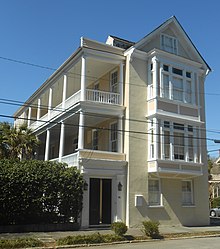| William Ashmead Courtenay | |
|---|---|
 | |
| 46th Mayor of Charleston | |
| In office 1879–1887 | |
| Preceded by | William W. Sale |
| Succeeded by | George D. Bryan |
| Personal details | |
| Born | February 4, 1831 Charleston, South Carolina |
| Died | March 17, 1908(1908-03-17) (aged 77) Columbia, South Carolina |
| Political party | Democrat |
| Spouse | Julia Ann Francis |
| Children | Mrs. J.M. Bateman, Mrs. L.M. Barnwell, Rev. Carlile Courtenay, St. John Courtenay, Ashmead Courtenay, Campbell Courtenay |
| Profession | Publisher and journalist |

William Ashmead Courtenay was the forty-sixth mayor of Charleston, South Carolina, serving two terms from 1879 to 1887.
Early life
Courtenay was born on February 4, 1831, a son of Edward Smith Courtenay and Elizabeth Storer Wade. He attended the Classical and English Academy of Dr. J. C. Faber until he turned fifteen.
From 1850 to 1860 he was occupied in the publishing and book selling business. In 1860, he accepted a position as the business manager for the Charleston Mercury, a leading political newspaper of South Carolina.
Civil War
Courtenay joined the Confederate military in 1861 and served throughout the American Civil War. He contributed to the Charleston Mercury as a war correspondent.
Following the war, Courtenay was destitute, and he worked in Newberry, South Carolina, shuttling materials via wagon to replace the trains that had been damaged during the Civil War.
Later life
Courtenay returned to Charleston in 1866 and started a shipping business. When he was elected in 1879 as mayor, he worked to systematize and simplify city government. He pushed an amendment to the city charter which practically forbade any new debt by the city. He expressed his beliefs on the matter thus: "The money which we handle belongs to the people and not to us. We can only take it from them for legitimate expenses of government. More than this is a robbery. Official generosity is official crime." He ran unopposed in 1883.
In addition to reform of city finances, Courtenay had other accomplishments. He oversaw the final settlement of a bequest from William Enston which was finally used for the creation of the William Enston Home. He changed the Charleston fire department from a volunteer force to a paid department.
After leaving political office, he established the Courtenay Manufacturing Company in Newry, South Carolina. He was also a member of the South Carolina Historical Commission which oversaw the state's historic archives.
Courtenay died on March 17, 1908, at his home on Pendleton Street, Columbia, South Carolina. His body was returned to Charleston for burial at Magnolia Cemetery.
Courtenay Middle School on upper Meeting Street, Charleston, South Carolina was named in his honor.
References
- William Ashmead Courtenay, Preservation Society of Charleston
- McNeely, Patricia G. Knights of the Quill: Confederate Correspondents and Their Civil War Reporting. West Lafayette, Ind.: Purdue University Press, 2010
- ^ "Capt Wm A. Courtenay Is Dead". Charleston News & Courier. March 18, 1908. p. 1. Retrieved January 18, 2014.
- Wates, Wylma Anne (1979). "In the Beginning: South Carolina Hires Its First Archivist". The South Carolina Historical Magazine. 80 (2): 186–191. ISSN 0038-3082. JSTOR 27567556.
- "William Ashmead Courtenay (1831-1908)". Find a Grave. Retrieved January 18, 2014.
External links
- Works by or about William Ashmead Courtenay at the Internet Archive
- William Ashmead Courtenay, Preservation Society of Charleston
| Political offices | ||
|---|---|---|
| Preceded byWilliam W. Sale | Mayor of Charleston, South Carolina 1879–1887 |
Succeeded byGeorge D. Bryan |